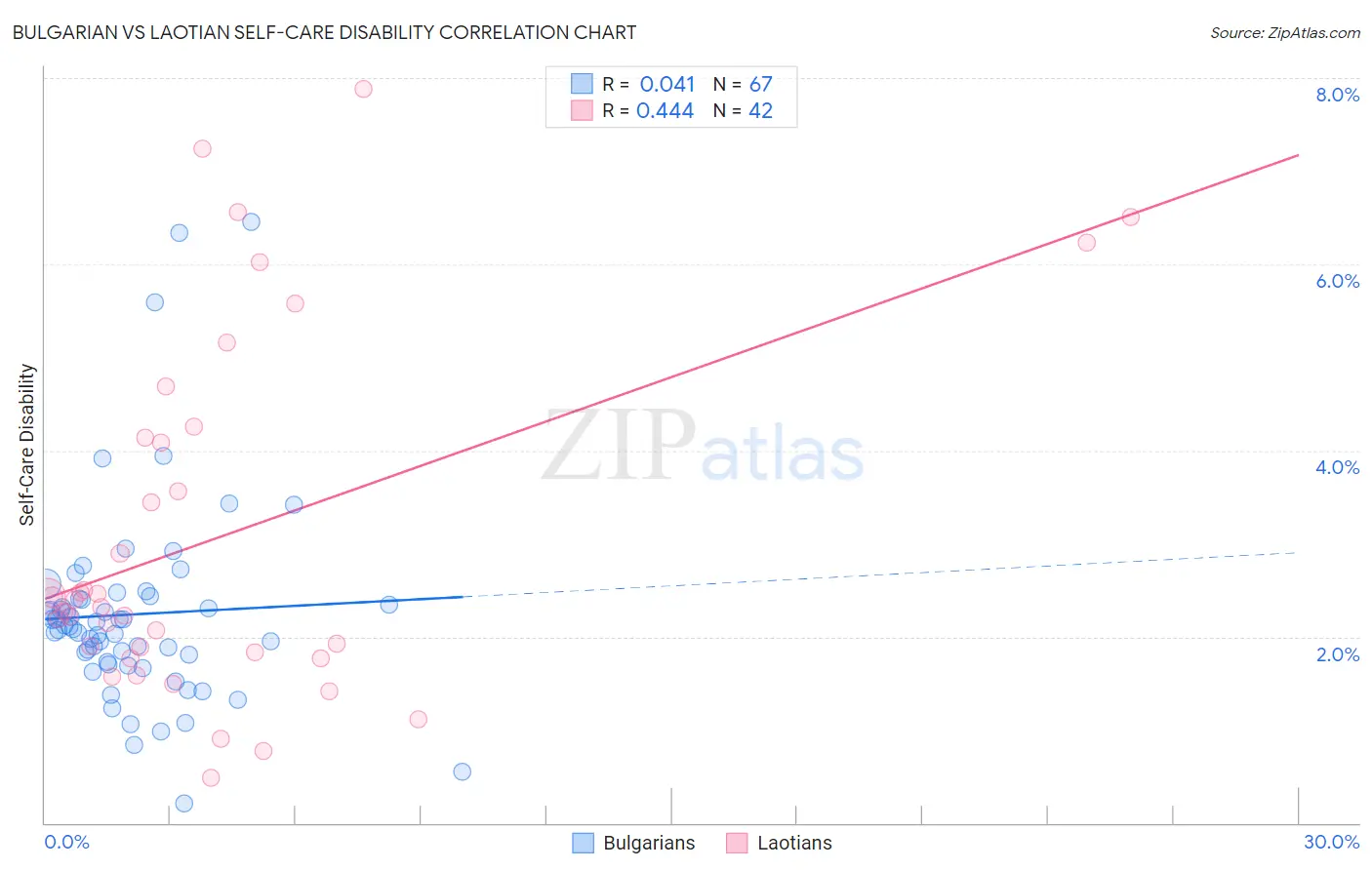Bulgarian vs Laotian Self-Care Disability
COMPARE
Bulgarian
Laotian
Self-Care Disability
Self-Care Disability Comparison
Bulgarians
Laotians
2.2%
SELF-CARE DISABILITY
100.0/ 100
METRIC RATING
21st/ 347
METRIC RANK
2.4%
SELF-CARE DISABILITY
87.8/ 100
METRIC RATING
135th/ 347
METRIC RANK
Bulgarian vs Laotian Self-Care Disability Correlation Chart
The statistical analysis conducted on geographies consisting of 205,516,049 people shows no correlation between the proportion of Bulgarians and percentage of population with self-care disability in the United States with a correlation coefficient (R) of 0.041 and weighted average of 2.2%. Similarly, the statistical analysis conducted on geographies consisting of 224,705,626 people shows a moderate positive correlation between the proportion of Laotians and percentage of population with self-care disability in the United States with a correlation coefficient (R) of 0.444 and weighted average of 2.4%, a difference of 8.1%.

Self-Care Disability Correlation Summary
| Measurement | Bulgarian | Laotian |
| Minimum | 0.21% | 0.49% |
| Maximum | 6.5% | 7.9% |
| Range | 6.2% | 7.4% |
| Mean | 2.2% | 3.1% |
| Median | 2.1% | 2.4% |
| Interquartile 25% (IQ1) | 1.7% | 1.8% |
| Interquartile 75% (IQ3) | 2.4% | 4.1% |
| Interquartile Range (IQR) | 0.68% | 2.3% |
| Standard Deviation (Sample) | 1.1% | 1.9% |
| Standard Deviation (Population) | 1.1% | 1.9% |
Similar Demographics by Self-Care Disability
Demographics Similar to Bulgarians by Self-Care Disability
In terms of self-care disability, the demographic groups most similar to Bulgarians are Immigrants from Venezuela (2.2%, a difference of 0.040%), Tongan (2.2%, a difference of 0.25%), Cambodian (2.2%, a difference of 0.25%), Immigrants from Eritrea (2.2%, a difference of 0.33%), and Cypriot (2.2%, a difference of 0.55%).
| Demographics | Rating | Rank | Self-Care Disability |
| Luxembourgers | 100.0 /100 | #14 | Exceptional 2.2% |
| Okinawans | 100.0 /100 | #15 | Exceptional 2.2% |
| Immigrants | Kuwait | 100.0 /100 | #16 | Exceptional 2.2% |
| Immigrants | Saudi Arabia | 100.0 /100 | #17 | Exceptional 2.2% |
| Immigrants | Taiwan | 100.0 /100 | #18 | Exceptional 2.2% |
| Immigrants | Eritrea | 100.0 /100 | #19 | Exceptional 2.2% |
| Tongans | 100.0 /100 | #20 | Exceptional 2.2% |
| Bulgarians | 100.0 /100 | #21 | Exceptional 2.2% |
| Immigrants | Venezuela | 100.0 /100 | #22 | Exceptional 2.2% |
| Cambodians | 100.0 /100 | #23 | Exceptional 2.2% |
| Cypriots | 100.0 /100 | #24 | Exceptional 2.2% |
| Turks | 100.0 /100 | #25 | Exceptional 2.2% |
| Immigrants | Sri Lanka | 99.9 /100 | #26 | Exceptional 2.2% |
| Venezuelans | 99.9 /100 | #27 | Exceptional 2.2% |
| Inupiat | 99.9 /100 | #28 | Exceptional 2.2% |
Demographics Similar to Laotians by Self-Care Disability
In terms of self-care disability, the demographic groups most similar to Laotians are Russian (2.4%, a difference of 0.050%), South American Indian (2.4%, a difference of 0.070%), Austrian (2.4%, a difference of 0.080%), Immigrants from Colombia (2.4%, a difference of 0.090%), and Immigrants from South America (2.4%, a difference of 0.12%).
| Demographics | Rating | Rank | Self-Care Disability |
| Immigrants | Hungary | 89.6 /100 | #128 | Excellent 2.4% |
| Immigrants | Romania | 89.3 /100 | #129 | Excellent 2.4% |
| Immigrants | Austria | 89.0 /100 | #130 | Excellent 2.4% |
| Poles | 88.9 /100 | #131 | Excellent 2.4% |
| Immigrants | South America | 88.8 /100 | #132 | Excellent 2.4% |
| Immigrants | Colombia | 88.5 /100 | #133 | Excellent 2.4% |
| Russians | 88.2 /100 | #134 | Excellent 2.4% |
| Laotians | 87.8 /100 | #135 | Excellent 2.4% |
| South American Indians | 87.2 /100 | #136 | Excellent 2.4% |
| Austrians | 87.0 /100 | #137 | Excellent 2.4% |
| Immigrants | Croatia | 86.6 /100 | #138 | Excellent 2.4% |
| Sri Lankans | 86.6 /100 | #139 | Excellent 2.4% |
| Immigrants | Uruguay | 85.4 /100 | #140 | Excellent 2.4% |
| Alaska Natives | 84.5 /100 | #141 | Excellent 2.4% |
| Immigrants | Peru | 83.2 /100 | #142 | Excellent 2.4% |